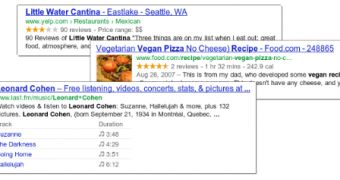Rich snippets, which go beyond the simple text sample, can be a really useful way of determining whether a search result returned by Google is worth visiting.
These snippets depend on metadata added by webmasters and, as with anything relating to search, people will try to abuse them. Alternatively those creating the metadata don't understand them all that well.
In any case, Google is now issuing some quality guidelines for webmasters related to metadata for rich snippets.
The aim is to make it clearer to websites what actions and what data is more likely to lead to rich snippets added to the results for their site and what actions may be marked as spammy or poor quality.
"Once you've correctly added structured data markup to you site, rich snippets are generated algorithmically based on that markup," Google explained.
"If the markup on a page offers an accurate description of the page's content, is up-to-date, and is visible and easily discoverable on your page and by users, our algorithms are more likely to decide to show a rich snippet in Google’s search results," it said.
Obviously, if that's not the case, then the markup will be ignored and Google will revert to plain text snippets for that site making all the work for nothing.
Google's algorithm is designed to spot poor quality metadata and ignore it, but Google can intervene itself and blacklist sites from having rich snippets generated for them.
Google has some clear examples of actions that could lead to a site being blacklisted. Marking up content that is hidden from users is not allowed, the same goes for markup that has nothing to do with the actual content of the page or the focus of the site.
It's not all clear cut like this, there are honest mistakes that could lead to the markup being ignored, Google has some examples.
- If your page is about a band, make sure you mark up concerts being performed by that band, not by related bands or bands in the same town. - If you sell products through your site, make sure reviews on each page are about that page's product and not the store itself. - If your site provides song lyrics, make sure reviews are about the quality of the lyrics, not the quality of the song itself.

 14 DAY TRIAL //
14 DAY TRIAL //